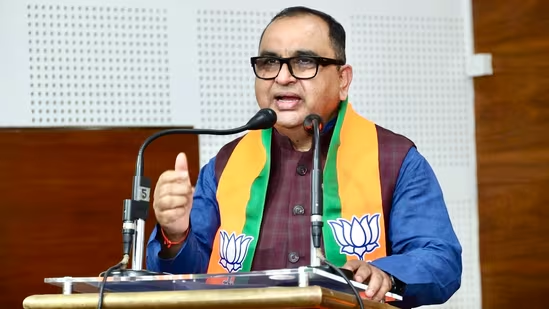Now Reading: BJP Leader Seeks Fatwa Against Man Arrested for Abusive Remarks on PM Modi
-
01
BJP Leader Seeks Fatwa Against Man Arrested for Abusive Remarks on PM Modi
BJP Leader Seeks Fatwa Against Man Arrested for Abusive Remarks on PM Modi

A political controversy has erupted following the arrest of Mohammad Rizvi, a 20-year-old resident of Darbhanga, Bihar, for allegedly using abusive language against Prime Minister Narendra Modi and his late mother during a rally led by Congress leader Rahul Gandhi. The incident has sparked widespread debate over the boundaries of political expression and the role of religious institutions in addressing such matters.
The Incident and Arrest
The controversy began when a video surfaced showing Rizvi, identified as a Congress supporter, using derogatory language during the ‘Voter Adhikar Yatra’ in Darbhanga. The video quickly went viral on social media, leading to public outrage. In response, the BJP filed an FIR, and Rizvi was arrested and remanded to 14 days of judicial custody .
Call for Religious Intervention
In a move that has intensified the debate, Jamal Siddiqui, the national president of the BJP Minority Morcha, has written to Darul Uloom Deoband, a prominent Islamic seminary, urging them to issue a fatwa against Rizvi. Siddiqui argued that Rizvi’s actions violated Islamic teachings, particularly the emphasis Islam places on respecting parents. He cited Surah Al-Isra (17:23) and Hadiths that describe mothers as the “gateways to paradise” to support his position .
Political Reactions and Implications
The incident has led to a political standoff between the BJP and Congress. While BJP leaders have condemned the remarks and demanded an apology from Congress leaders, the Congress party has distanced itself from Rizvi, asserting that he was not an official member and that his actions do not reflect the party’s values .
Legal and Social Considerations
Legally, Rizvi faces charges under Section 295A of the Indian Penal Code, which addresses deliberate and malicious acts intended to outrage religious feelings. This provision has been invoked in various cases involving hate speech and blasphemy .
Conclusion
The call for a fatwa against Rizvi highlights the complex interplay between politics, religion, and law in India. It raises pertinent questions about the limits of free speech, the role of religious authorities in public matters, and the responsibilities of political parties in managing the conduct of their supporters. As the legal proceedings continue, this case is likely to remain a focal point in discussions about political discourse and religious sensitivities in India.

























